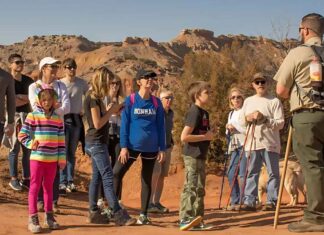
Who was Elizabeth Haddon Estaugh?
In celebration of Haddonfield’s Tricentennial, members of The Historical Society of Haddonfield and Jeffery Dorwart plan to shed some light on this important figure in the borough’s history with a new book titled “Elizabeth Haddon Estaugh, 1680–1762, Building the Quaker Community of Haddonfield, New Jersey, 1701–1762.”
Beginning 40 years ago, the project was started by Haddonfield resident Elizabeth “Betty” Lyons, a volunteer with the historical society. Since the 1960s, Lyons’ research led her to travel to both England and the West Indies, uncovering many facts about Estaugh.
While Lyons intended to publish her findings by 2013, the project was halted following her death in 2008.
Still determined to meet Lyons’ goal, the historical society sought help from members of Rutgers University to find Lyons’ successor. With the historical society already familiar with Dorwart, a professor emeritus at Rutgers University, he began sifting through Lyons’ research.
“I interviewed, and they told me to look through the papers and notes,” Dorwart said.
While there were many records and drafts to sift through, Dorwart said Lyons had completed a significant amount of research on Estaugh prior to her passing.
“In the last 300 years, she came closer to finding who Elizabeth Haddon was than anyone,” Dorwart said.
Dorwart said that to fill in the gaps in Lyons’ research, he began working on placing the facts of Estaugh’s life within historical and social context.
“I didn’t try to get in her mind. I tried to figure out the world around her,” Dorwart said.
To help his research, Dorwart said he began to look at history and at Quakerism at the time.
“I didn’t draw any conclusions that I couldn’t verify in fact,” Dorwart said.
With her father’s land serving as the heart of Haddonfield, Dorwart calls Estaugh a symbol of both men and women who built South Jersey.
Presenting a unique challenge to his research, Dorwart explained that Estaugh had left no letters behind and very few records, which he speculates may have been due to her house burning down in the 1840s.
“I realized why many people could never come to grips with her life,” Dorwart said.
However, Dorwart explained that Lyons was able to find business records that belonged of Estaugh’s father, John Haddon, while in England. In addition, Dorwart said records were found of Quaker meetings that took place at Estaugh’s home and travel records from Estaugh’s husband, John Estaugh.
“We have put to bed a lot of myths about Elizabeth,” Dorwart said.
For example, he said that one popular myth about Estaugh is that she was “too tiny,” and therefore, was unable to have children. Dorwart explained that there was no indication that Estaugh was incapable of having children, citing many of her friends who were also small and able to have many children.
Also, Dorwart said that through his research, he found that while she gave the land her father’s name, Elizabeth Estaugh always signed documents and was referred to by her married name, not her maiden name.
“She never used her name over here. It was always Estaugh,” Dorwart said.
He also added that although Estaugh moved into her plantation in 1713, he found records that the area had been referred to “Haddon Field” dating back to 1706.
Dorwart also added that while Estaugh is credited as the founder of Haddonfield, she was only part of a number of Quaker women who helped to shape modern-day South Jersey.
“She is credited as the founder, but the title diminishes her role,” Dorwart said. “She is more important than that. She’s a symbol of the women who founded the Delaware Valley. She’s a product of an amazing time in American history.”
In compiling the biography, Dorwart also conducted many book conferences with historian Paul Schopp. In addition, both authors of “Lost Haddonfield,” Kathy Tassini and Doug Rauschenberger, helped to edit the book, which Dorwart explained was financed by both Joe Murphy and Lyons’ trust.
“It’s really a nice group effort, and everybody is really excited,” Dorwart said.
“Elizabeth Haddon Estaugh, 1680–1762, Building the Quaker Community of Haddonfield, New Jersey, 1701–1762” was to be officially released on Dec. 8 during a reception a Greenfield Hall.
Copies of the book are on sale for $25 by The Historical Society of Haddonfield, The Book Swap and the Haddonfield Information Center.
For more information on purchasing a copy of “Elizabeth Haddon Estaugh, 1680–1762, Building the Quaker Community of Haddonfield, New Jersey, 1701–1762,” visit www.haddonfieldhistory.org or call 429–7375.









